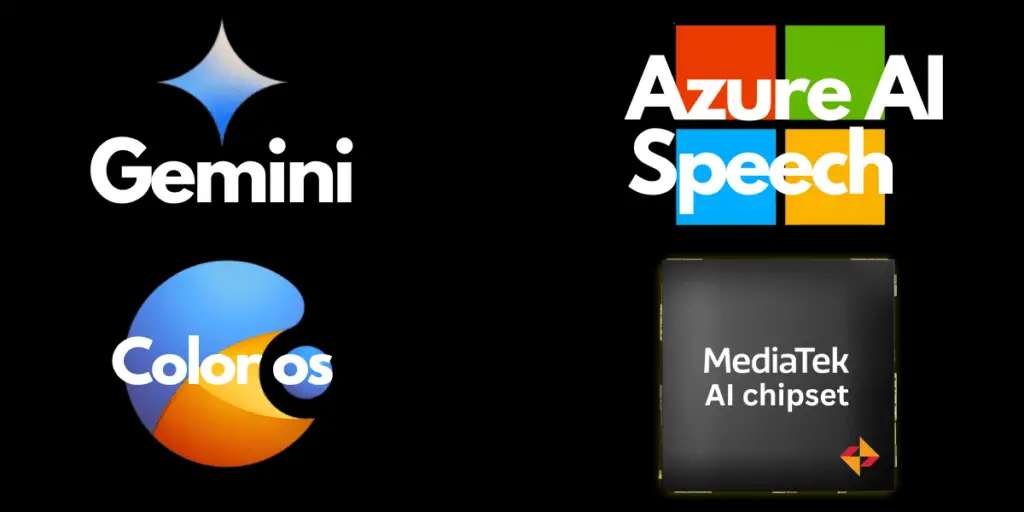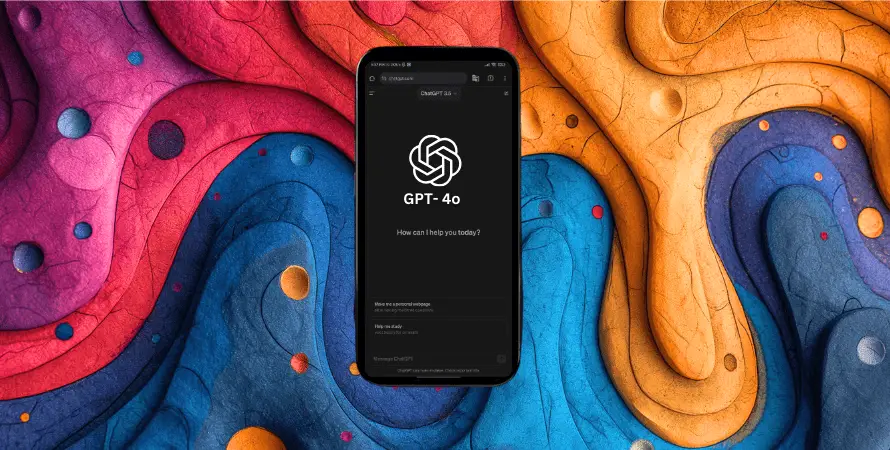Oppo, a leading name in the smartphone industry, has Reveled a bold new chapter in its technological journey by introducing over 100 generative AI features across its smartphone portfolio this year.
This significant development is part of Oppo’s AI Vision to revolutionize the user experience through cutting-edge AI innovations.
With a robust AI patent portfolio that includes over 5,399 AI-related patents globally—3,796 dedicated to AI imaging—Oppo is not just keeping pace with technological advancements but setting new standards.
Oppo established an AI Centre in Shenzhen, marking a pivotal step in driving its AI innovation. Collaborations with tech giants like Google and Microsoft and chipset manufacturers like MediaTek and Qualcomm further underline Oppo’s commitment to enhancing AI capabilities.
These partnerships aim to develop sophisticated AI features encompassing image processing, computer vision, speech technology, natural language processing , and machine learning.
By integrating these features into smartphones across various price points, Oppo is set to make advanced AI technology accessible to a broader audience, significantly impacting the smartphone landscape.
Oppo’s AI Vision and Innovations
Oppo’s vision for artificial intelligence is centered around transforming how users interact with their smartphones, making technology more intuitive, personalized, and powerful.
At the heart of this vision is the establishment of Oppo’s AI Centre in Shenzhen, a hub for driving AI innovation and developing proprietary technologies.
This center plays a crucial role in Oppo’s mission to integrate advanced AI features into its smartphones, ensuring users benefit from the latest technological advancements.
Oppo introduced several AI features to select smartphones in China with the ColorOS New Year Edition update. This update marked a significant milestone, bringing enhanced AI capabilities to users and setting the stage for a global rollout.
These features have since been expanded to more devices, demonstrating Oppo’s commitment to continuously enhancing the user experience through AI.
One of the standout initiatives is Oppo’s plan to introduce over 100 generative AI features across its smartphone portfolio by the end of 2024.
This ambitious goal includes existing AI features and new ones that will be announced in the coming months.
By making these features available across different price points, Oppo aims to democratize access to advanced AI technology, ensuring that more users can experience the benefits of AI-enhanced smartphones.
Oppo’s AI innovations are not just limited to software. The company has also been actively developing its own large language models since 2020.

It is working on large vision models and multimodal models. Notably, Oppo claims to have deployed an LLM with 7 billion parameters directly to smartphones, a testament to its commitment to pushing the boundaries of what’s possible with mobile AI.
Oppo’s AI vision and innovations are centered around making advanced AI technology accessible to a broader audience, enhancing the user experience, and driving the future of smartphone technology.
Through strategic collaborations, extensive R&D, and a strong focus on data privacy and security, Oppo is poised to lead the way in AI integration in the smartphone industry.
AI Features Across All Price Points
Oppo is set to revolutionize the smartphone experience by introducing an extensive range of AI features across its entire portfolio, ensuring that users can benefit from advanced technology at every price point.
By the end of 2024, Oppo plans to integrate over 100 generative AI features into its smartphones, from flagship models to more affordable options.
This democratization of AI technology underscores Oppo’s commitment to making cutting-edge innovations accessible to a broader audience.
The rollout of these AI features is designed to enhance various aspects of smartphone usage, providing users with more intuitive and personalized experiences.
Some existing AI features garnered attention, including advanced image processing capabilities, AI-enhanced photography, and intelligent voice assistants.
These features have been included in Oppo’s ColorOS New Year Edition update, initially launched in China and has since expanded globally.

Oppo’s AI R&D Centre plays a pivotal role in developing and deploying these features. The center focuses on creating proprietary technologies that can be seamlessly integrated into Oppo’s diverse range of smartphones.
The company’s extensive patent portfolio, which includes 3,796 patents related to AI imaging alone, highlights the depth of its research and innovation in this field.
Oppo is collaborating with leading technology companies such as Google, Microsoft, MediaTek, and Qualcomm to achieve its ambitious goals.
These partnerships enable Oppo to leverage the expertise and resources of its collaborators, optimizing AI features for both hardware and software.
For instance, Oppo’s collaboration with Microsoft involves using Azure AI Speech Service for audio recording transcription, enhancing the natural voice and text conversion experience on Oppo devices.
Oppo is working with MediaTek to develop chipsets with dedicated AI processing units, known as Neural Processing Units.
These NPUs are crucial for optimizing the performance of AI features, ensuring smooth and efficient operation across different device tiers.
By integrating Google’s Gemini LLM into its flagship devices, Oppo aims to provide users with powerful AI capabilities that enhance productivity and creativity.
Extensive AI Patent Portfolio
Oppo’s commitment to advancing artificial intelligence is evident in its extensive and impressive patent portfolio. With over 5,399 AI-related patents filed globally, Oppo has positioned itself as a leader in AI innovation within the smartphone industry.
This robust portfolio underscores the company’s dedication to research and development and its ambition to push the boundaries of what AI can achieve.
Many of these patents, precisely 3,796, are related to AI imaging. This focus on AI imaging highlights Oppo’s efforts to enhance camera and image processing technologies through artificial intelligence.
By leveraging these patents, Oppo aims to provide users with superior photography and video capabilities, making capturing high-quality images and videos with their smartphones easier.
Oppo’s AI patents cover a wide range of technologies and applications, including but not limited to
- Enhancing photo and video quality through advanced algorithms that improve clarity, color accuracy, and low-light performance.
- Enabling smartphones to understand and interpret visual information, allowing for features such as object recognition, augmented reality, and real-time scene analysis.
- Developing sophisticated voice recognition and synthesis technologies that enable natural and accurate interaction with the device.
- Improving the ability of smartphones to understand, interpret, and respond to human language, facilitating more intuitive and conversational user interactions.
- Applying advanced machine learning techniques to optimize various smartphone functions, from battery management to predictive text input.

Oppo’s patent portfolio also includes innovations in other cutting-edge AI fields. The company’s focus on developing large language models and multimodal models demonstrates its commitment to staying at the forefront of AI research.
These models enable more complex and nuanced understanding and generation of human language and multimedia content, enhancing the overall user experience.
Oppo’s extensive patent portfolio is a testament to its innovation and strategic asset, enabling it to collaborate effectively with other industry leaders.
By working with companies like Google, Microsoft, MediaTek, and Qualcomm, Oppo can integrate its patented technologies into broader ecosystems, ensuring its AI features are optimized for hardware and software.
Enhanced AI Capabilities
Oppo’s ambition to lead in AI innovation is significantly bolstered by strategic collaborations with some of the world’s leading technology companies.
These partnerships play a crucial role in enhancing Oppo’s AI capabilities, enabling the integration of cutting-edge technologies into its smartphones and ensuring a superior user experience.
By joining forces with industry giants such as Google, Microsoft, MediaTek, and Qualcomm, Oppo can leverage its expertise and resources to push the boundaries of what is possible with AI.
Oppo’s partnership with Google is centered around leveraging Google’s advanced AI technologies to enhance its smartphone features.
One key area of collaboration is the integration of Google’s Gemini large language model into Oppo’s flagship devices. This LLM powers various AI features, including advanced natural language processing capabilities, enabling more intuitive and context-aware interactions with the device.
Google’s expertise in machine learning and AI-driven algorithms helps optimize image processing, voice recognition, and other critical smartphone functionalities.
Working with Microsoft, Oppo aims to bring users a natural voice and text conversion experience. This collaboration involves leveraging Microsoft’s Fast Transcription and Neural Text-to-Speech technologies.
Oppo smartphones can offer enhanced audio recording transcription and voice interaction capabilities by using these technologies.
The Azure AI Speech Service, already employed by Oppo, ensures accurate and efficient transcription of audio recordings.
This partnership aims to bridge the gap between desktop AI and mobile AI, allowing users to utilize desktop features like Microsoft’s Copilot for content generation, text translation, and address searching directly from their smartphones.
Oppo’s collaboration with MediaTek focuses on developing advanced chipsets with dedicated AI processing units, known as Neural Processing Units.
These NPUs are essential for optimizing the performance of AI features on Oppo’s smartphones, ensuring that AI-driven tasks are executed efficiently and effectively.
By working closely with MediaTek, Oppo can tailor the AI capabilities of its chipsets to meet the specific needs of its devices, enhancing everything from image processing to power management.
Qualcomm, a leader in mobile chipset manufacturing, is another critical partner in Oppo’s AI strategy. Through this collaboration, Oppo benefits from Qualcomm’s cutting-edge AI technologies, which are integrated into its Snapdragon processors.
These technologies enable advanced AI features such as real-time object recognition, enhanced camera capabilities, and improved energy efficiency.
Qualcomm’s AI engine also supports Oppo’s efforts in developing large language models and multimodal AI applications, further enhancing the overall user experience.
Through these collaborations, Oppo is focusing on several critical areas of AI development: enhancing photo and video quality through advanced algorithms and real-time processing.
Enabling smartphones to understand and interpret visual information for features like augmented reality and scene analysis; improving voice recognition and synthesis for more natural and accurate voice interactions.
Enhancing the ability of smartphones to understand and respond to human language more intuitively; and applying machine learning techniques to optimize various smartphone functions, from battery management to predictive text input.
Oppo’s strategic collaborations with Google, Microsoft, MediaTek, and Qualcomm are instrumental in its quest to lead in AI innovation.
These partnerships enable Oppo to integrate cutting-edge AI technologies into its smartphones, ensuring users benefit from the most advanced features.
By focusing on key areas of AI development and leveraging the expertise of its partners, Oppo is well-positioned to deliver a superior and intelligent smartphone experience to its users.
Large Language and Vision Models
Oppo’s dedication to AI innovation is exemplified by its significant investments in the development of large language models and large vision models.
These models are at the forefront of AI research and are crucial for enhancing the capabilities of modern smartphones. By focusing on both language and vision, Oppo aims to provide users with a more intelligent, interactive, and intuitive experience.
Since 2020, Oppo has been actively developing its own LLMs, which are designed to process and understand human language at an advanced level.
These models are characterized by their ability to handle a vast amount of linguistic data, enabling them to perform a wide range of tasks such as natural language understanding, text generation, machine translation, and sentiment analysis.
NLU enhances the ability of smartphones to comprehend and interpret user commands, questions, and conversations in a natural and context-aware manner.
Text generation produces coherent and contextually relevant text, which can be used for features like predictive text, automated email responses, and content creation.
Machine translation provides accurate and fluent translation services between multiple languages, facilitating communication for users worldwide. Sentiment analysis understands the emotional tone behind user inputs, allowing for more personalized and empathetic interactions.
One of the notable achievements in Oppo’s LLM development is the deployment of an LLM with 7 billion parameters directly to smartphones.
This model allows Oppo devices to offer sophisticated language processing capabilities without relying heavily on cloud services, thus ensuring faster response times and enhanced privacy.
In parallel with its LLM efforts, Oppo is also focusing on developing large vision models that significantly enhance the visual processing capabilities of its smartphones.

These models are essential for applications such as object recognition, image enhancement, facial recognition, and visual search.
Object recognition identifies and classifies objects within images and videos, enabling features like augmented reality, enhanced camera functionalities, and real-time scene analysis.
Image enhancement improves the quality of photos and videos through advanced algorithms that adjust lighting, color balance, sharpness, and noise reduction.
Facial recognition offers secure and reliable facial recognition for unlocking devices, authorizing transactions, and personalizing user experiences.
Visual search allows users to search for information, products, or similar images by simply taking a photo or uploading an image.
By integrating large vision models into its smartphones, Oppo is able to provide users with powerful visual processing capabilities that enhance everyday tasks, from taking better photos to engaging with augmented reality applications.
Oppo is also exploring the development of multimodal models, which combine both language and vision capabilities. These models are designed to process and understand information across multiple modes of communication, enabling more comprehensive and intuitive interactions.
A multimodal model can interpret and respond to voice commands while analyzing the visual context of the environment, generate descriptive text for images, making it easier for users to understand and interact with visual content, and enhance video content by understanding and integrating audio and visual elements in a cohesive manner.
By developing these advanced models, Oppo continues to push the boundaries of AI technology, ensuring that its smartphones remain at the cutting edge of innovation.


